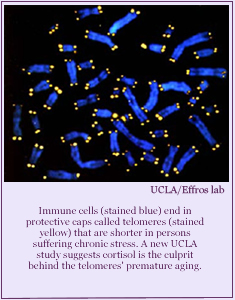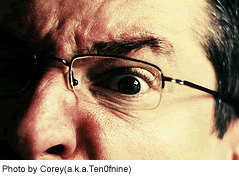Most people would agree that stress increases your risk for illness and this is particularly true for severe long-term stresses, such as caring for a family member with a chronic medical illness. However, we still have a relatively limited understanding of exactly how stress contributes to the risk for illness. In the August 15th issue of Biological Psychiatry, researchers shed new light on one link between stress and illness by describing a mechanism through which stress alters immune function. [continue reading…]
Stress
 Immune cells (stained blue) end in protective caps called telomeres (stained yellow) that are shorter in persons suffering chronic stress. A new UCLA study suggests cortisol is the culprit behind the telomeres’ premature aging.
Immune cells (stained blue) end in protective caps called telomeres (stained yellow) that are shorter in persons suffering chronic stress. A new UCLA study suggests cortisol is the culprit behind the telomeres’ premature aging.
Every cell contains a tiny clock called a telomere, which shortens each time the cell divides. Short telomeres are linked to a range of human diseases, including HIV, osteoporosis, heart disease and aging. Previous studies show that an enzyme within the cell, called telomerase, keeps immune cells young by preserving their telomere length and ability to continue dividing. [continue reading…]
 Did you know that one person in 20 has had a fight with a next-door neighbour? That one driver in four admits to committing an act of road rage? That cases of “air rage” rose by 400 per cent between 1997 and 2000? That stress has overtaken the common cold as the main reason for taking time off work?
Did you know that one person in 20 has had a fight with a next-door neighbour? That one driver in four admits to committing an act of road rage? That cases of “air rage” rose by 400 per cent between 1997 and 2000? That stress has overtaken the common cold as the main reason for taking time off work?
Link to read this Times Article written by Carol Midgley,
Published 13 June 2008Â
Â
The New Scientist , May 31, 2008, reviews a study on how severe stress affects pregnant women.
Stress has been linked to premature birth, high blood pressure and other health problems associated with stillbirths. Now Kirsten Wisborg from the Aarhus University Hospital in Denmark and colleagues have shown that stress increases the risk even when women don’t have these problems. “We don’t yet know for sure whether stress may directly cause stillbirth, but our results are enough for doctors and midwives to be concerned,” she says
Source: AlphaGalileo, The New Scientist , May 31, 2008Â
